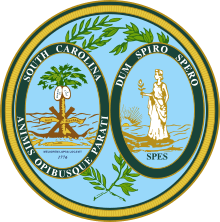2002 United States Senate election in South Carolina
The 2002 United States Senate election in South Carolina was held on November 5, 2002. Longtime Republican incumbent Strom Thurmond decided to retire at the age of 100, becoming the first Centenarian to ever serve in Congress. At that time, Thurmond was the longest serving Senator in U.S. history, but his record was later surpassed by West Virginia's Robert Byrd. Republican U.S. Representative Lindsey Graham won the open seat, becoming the first non-incumbent Republican Senator from South Carolina since Reconstruction, as Thurmond had been elected as a Democrat, but switched parties in 1964. This was the first open Senate election in South Carolina since 1966.
| |||||||||||||||||
| |||||||||||||||||
 County Results
Graham: 50–60% 60–70% 70–80% Sanders: 40-50% 50–60% 60–70% 70–80% | |||||||||||||||||
| |||||||||||||||||
Democratic primary
Alex Sanders, the former president of the College of Charleston, entered the race and faced no opposition from South Carolina Democrats, thereby avoiding a primary election.
Republican primary
Representative Lindsey Graham had no challenge for the Republican nomination and thus avoided a primary election.[1] This was due in large part because the South Carolina Republicans were preoccupied with the gubernatorial race[2] and also because potential rivals were deterred by the huge financial war chest Graham had amassed early in the campaign.[3]
General election
Candidates
- Ted Adams (C)
- Lindsey Graham (R), U.S. Representative
- Victor Kocher (L)
- Alex Sanders (D), former President of the College of Charleston
Campaign
The election campaign between Graham and Sanders pitted ideology against personality. Graham spread his message to the voters that he had a consistent conservative voting record and that his votes in Congress closely matched that of outgoing Senator Strom Thurmond. Sanders claimed that he was best to represent South Carolina in the Senate because he held membership in both the NAACP, the Sons of Confederate Veterans, the NRA, and because he said that his positions more closely matched the citizens of the state. He said that he was against the death penalty for religious reasons, supported abortion rights, and was for greater government involvement in education. Graham attacked Sanders for these positions consistently throughout the campaign, but Sanders hit back at Graham for wanting to privatize social security.
Graham scored an impressive victory in the general election and the margin of victory proved that Democrats had little chance of winning an election in the state for a federal position. He achieved his victory because he rolled up strong margins the Upstate and was able to also achieve a majority in the Lowcountry, an area which Sanders had been expected to do well since he hailed from Charleston. However, strong support in the Lowcountry for Republican gubernatorial candidate Mark Sanford doomed Sanders chances of running up a margin in the coastal counties.
Debates
- Complete video of debate, October 6, 2002
- Complete video of debate, October 13, 2002
- Complete video of debate, October 18, 2002
- Complete video of debate, October 20, 2002
- Complete video of debate, October 25, 2002
Polling
| Source | Date | Graham (R) | Sanders (D) |
|---|---|---|---|
| Zogby International | October 11, 2002 | 47% | 35% |
| Mason-Dixon Political/Media Research | October 13, 2002 | 51% | 34% |
| SurveyUSA | October 20, 2002 | 53% | 44% |
| SurveyUSA | October 27, 2002 | 49% | 48% |
| Mason-Dixon Political/Media Research | October 29, 2002 | 53% | 36% |
| SurveyUSA | November 4, 2002 | 49% | 48% |
Results
| Party | Candidate | Votes | % | ± | |
|---|---|---|---|---|---|
| Republican | Lindsey Graham | 600,010 | 54.4% | +1.0% | |
| Democratic | Alex Sanders | 487,359 | 44.2% | +0.2% | |
| Constitution | Ted Adams | 8,228 | 0.7% | +0.7% | |
| Libertarian | Victor Kocher | 6,684 | 0.6% | -0.5% | |
| No party | Write-Ins | 667 | 0.1% | +0.1% | |
| Majority | 112,651 | 10.2% | +0.8% | ||
| Turnout | 1,102,948 | 53.9% | -10.1% | ||
| Republican hold | Swing | ||||
References
- Randolph, Eleanor. "How to Succeed an Eight-Term Legend in South Carolina". nytimes.com. The New York Times Company. Retrieved 17 November 2019.
- Halbfinger, David M. "THE 2002 ELECTIONS: THE GOVERNOR RACES; G.O.P. May Retain Its Lead in Statehouses". nytimes.com. The New York Times Company. Retrieved 17 November 2019.
- "Rep. Lindsey Graham - South Carolina District 03". opensecrets.org. The Center for Responsive Politics. Retrieved 17 November 2019.
- "2002 U.S. SENATE RESULTS". fec.gov. Retrieved 17 November 2019.
- Bullock, Charles S.; Mark J. Rozell (2006). The New Politics of the Old South: An Introduction to Southern Politics. Rowman & Littlefield. pp. 39–41.
- Hammond, James (November 6, 2002). "Graham claims Thurmond legacy for U.S. Senate". GreenvilleOnline.com. Archived from the original on January 24, 2013. Retrieved January 31, 2008.
- Johnson, Sasha (May 3, 2002). "S.C. Democrats eye Thurmond, fall elections". CNN. Retrieved January 31, 2008.
- Kiker, Douglas (August 9, 2002). "Trying To Fill Ol' Strom's Shoes". CBS News. Retrieved January 31, 2008.
- Manjoo, Farhad (November 1, 2002). "Guns, lies and the Internet in South Carolina". Salon.com. Archived from the original on March 12, 2005. Retrieved January 31, 2008.
See also
- United States Senate elections, 2002
- List of United States Senators from South Carolina
- South Carolina gubernatorial election, 2002


